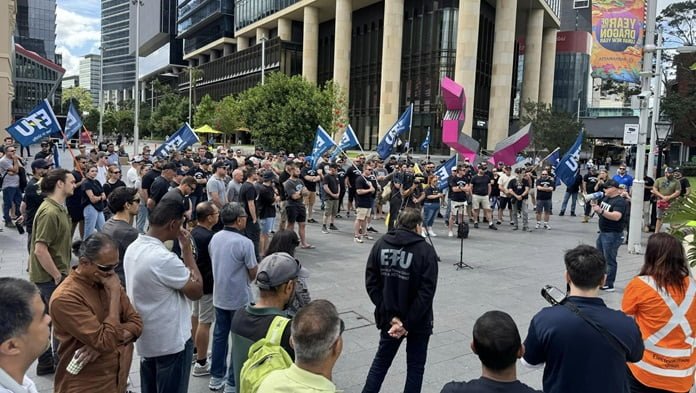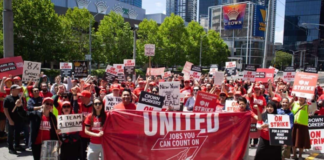More than 1000 Endeavour Energy and Transgrid workers, members of the Electrical Trades Union (ETU), walked out on strike last week for 24 hours.
The workers maintain the electricity network of poles and wires over most of NSW.
Workers at Endeavour are asking for a wage rise of 8 per cent a year for three years. Workers are now “a long way behind”, as one worker told Solidarity, after years of below-inflation pay rises. Wages have risen just 10.5 per cent since 2019 while living costs have rocketed by up to 18 per cent.
“Workers simply cannot afford to keep going backwards,” ETU NSW/ACT Secretary Allen Hicks said. “Pay rises have moved at half the rate of the inflation. Take home pay is shrinking.”
They are also fighting for better conditions when on standby—currently sitting at only $33 a day. On standby, “you’re not allowed to be more than half an hour away from your home. And if they call you, you’ve got to be at work within as quick as you can for an emergency breakdown,” one worker said.
Endeavour have offered workers an upfront $1000 payment followed by pay increases of just 5.25 per cent from 1 July, 3.25 per cent the next year and then 2.75 per cent the year after.
Yet 15 Endeavour executives and the board of directors picked up nearly $7.8 million last year, a 12.4 per cent increase.
But who takes the call to fix a powerline in a storm? Who responds to emergency breakdowns? Who maintains the grid so that everyone can get electricity? It’s certainly not the executives or the major shareholders, among them Macquarie Bank.
One Endeavour worker told Solidarity that as an electrician “you do emergency work where you put yourself, your life at risk, wading through waters, working in storm activity, working in fires, all that type of work”.
Renewables
The bosses have tried to use the urgent need for renewable energy to demand workers sacrifice their living standards, claiming they are “risking the decarbonisation of the grid”.
According to the Trangrid bosses, the strikes have put Transgrid’s $2.3 billion EnergyConnect transmission line build between South Australia and NSW at risk.
But what’s really putting EnergyConnect at risk is the delay in giving workers the pay they deserve.
At Endeavour, working conditions have been hit since privatisation in 2017—and household electricity bills have also risen. Transgrid was privatised in 2015.
The fastest way to transition to renewables would be to re-nationalise the grid, transition it to clean energy and pay workers what they’re owed. Instead, the federal government is spending $368 billion on the AUKUS nuclear submarines—far more than what it’s investing in renewables.
Unity
Workers from all sections of Transgrid and Endeavour went out on strike, from the transmission lines, high voltage underground cables, substations, switching stations, digital infrastructure and more.
In a protected action ballot 80 per cent of members responded, with 95 per cent voting for industrial action.
An Endeavour worker told Solidarity, “This is very much a grassroots campaign. We ran months and months of surveys before we started bargaining with members. We got feedback from the other members, and we’ve taken every step that we can to make sure that we’re keeping them in.
“When we took our protected action, we made sure that this was something that everyone could take rather than just a select few carrying the weight of everyone else.”
Building on that kind of unity and stepping up the industrial struggle is the way to win. Workers across the board are facing a cost-of-living crisis. If workers at Transgrid and Endeavour can win above-inflation pay rises, it will show workers everywhere how to fight for pay rises.
By Jayden Rivers






